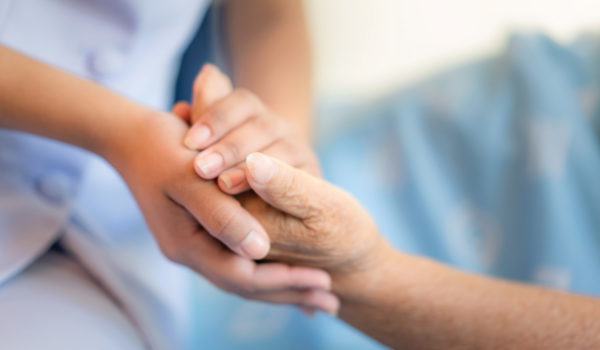
by Rebecca Berfanger // photography submitted
Nurse Navigators steer patients through cancer treatments
For many patients who have recently been diagnosed with cancer, they will be bombarded with information from people they’re meeting for the first time. These appointments can include oncologists, physicians, surgeons, radiation technicians, specialists, therapists, pharmacists, social workers, financial counselors, dietitians, genetic counselors, and any combination of some or all of these or other professionals, depending on the facility and the type of diagnosis.
Each person or team of people has a specific role to play, and it — along with the news of the diagnosis — is often overwhelming, especially in the beginning but throughout the treatment.
To guide people through all the information, cancer facilities are employing nurse navigators, nurses who work with cancer patients to educate and inform, coordinate their schedules or just be a reassuring voice to explain what is happening.
Many of these navigators have prior experience or certifications in various practice areas, which include oncology, radiation, chemotherapy and surgery. This knowledge helps them translate information for patients, especially when they have additional questions.
Overcoming barriers
Consensus among nurse navigators is that because there are so many meetings early on and so much information is shared, a cancer diagnosis is almost always a lot to process, especially given the serious nature of the disease they are fighting.
At the diagnosis, the experience can be “so traumatic,” says Lisa Davey, a breast cancer nurse navigator for Franciscan Health Indianapolis, that even if she has met with them already, “they don’t even remember me or who I am. They might remember about 10 percent of what I said or what I talked about. So there is a lot of repetition.”
What they can do is offer their help.
For instance, Becky Brummett, cancer patient navigator at the Johnson Memorial Health Cancer Center, meets with patients after various appointments. Patients know they are also welcome to call her with their questions.
“I say to them it doesn’t matter if we’ve already answered that, it doesn’t matter what your question is, it doesn’t matter if you have to ask it five times until you understand it,” says Brummett. “Education and support are my main role, making sure they understand what’s going on and supporting them in whatever is going on. Whether it’s at home, whether it’s financial or insurance or side effects or not understanding why they need to have another scan done.”
Because they are there shortly after the first diagnosis — or even at the diagnosis, depending on the circumstances — nurse navigators work with the patients to overcome various barriers. Cassie Osborne, a nurse navigator at the Community South Cancer Center, said that the biggest barriers she notices with her patients are financial and transportation.
For the financial barriers, many facilities offer support, whether it’s helping patients determine if they are eligible for Medicaid or helping them figure out options when it comes to insurance if they are qualified. Nurse navigators often connect patients with these resources.
As far as transportation, nurse navigators mentioned that especially clients who live in more rural parts of Johnson County, or patients who aren’t able to rely on friends and family for rides, sometimes local churches will be able to help, as well as the Little Red Door Cancer Agency.
Brummett said that although transportation isn’t as much of an issue among her patients, it is among the questions she’ll ask early on when getting to know each person. She’ll also suggest that if they can bring someone with them to appointments, that can help as an extra set of ears or someone who can help take notes that the patient might not remember.
Fighting misinformation
Another barrier, according to all three nurse navigators interviewed, is the misinformation that patients have before they know what their own treatment will entail.
For instance, they might have friends or family who went through chemotherapy or radiation even 15 or 20 years ago and not realize how much treatment has changed in the last several years. They might also do internet research.
“Google is not always our friend, and I tell them that,” says Osborne. “Anyone can write about oncology. I always tell patients, ‘Stay away from the blogs.’ It’s like when you go to a bad restaurant, everyone talks about it. The blogs, sometimes they’re scary, because they’re not always telling their good stories. I tell them, ‘If you’re going to go online, go to a reputable website. Go to American Cancer Society, go to the NCCN [National Comprehensive Cancer Network]; don’t join the Facebook groups.”
Even when friends and family mean well, adds Brummett, many will tell patients horror stories about their own interactions with cancer treatments from 20 years ago.
“Or we have a lung cancer patient talking to a breast cancer patient, and the medications are different, the treatments are so different. They come with preconceived ideas with what it’s going to be like. It’s kind of hard to bring a person back around to positive thinking when they already have heard about all of these other experiences.”
This is a test
In addition to changes in treatment, nurse navigators can discuss options when it comes to genetic testing and counseling, says Osborne.
“The testing helps in a lot of different ways. For my breast cancer patients, it helps them to know if they have a mutation, if they want to consider a bilateral mastectomy,” she says, or it helps determine if they may be at risk for other cancers.
“If an entire family has these genetics, we can do preventive and education and early monitoring,” she adds. “We’re also getting to the point where we can use genetic testing to help with the treatment plan itself.”
She also cautions if a patient uses a mail-away DNA testing kit, that they should only consider the results for entertainment value and not as a diagnostic tool. “You need the counseling to go with it,” she adds. “Some things might come back that aren’t actionable.”
Ultimately, the nurse navigators agreed that the most important thing is to regularly have doctor appointments and to get recommended screenings to catch anything suspicious early on.
“Mammogram, Pap smears, colonoscopies, chest X-rays and labs, those are all screening things that are important for male and female both,” says Brummett. “Sometimes, patients say, ‘I didn’t feel sick at all,’ but then they get into a car accident and need to get a chest X-ray and something shows up. Luckily if you catch it quick enough, it’s a good thing.”
“A lot of cancers can be found early with screenings,” Osborne adds. “They’re easy, they’re convenient, your insurance pays for it. I know no one wants to get a colonoscopy, no one wants to go for a mammogram. They’re not fun, but potentially they could save your life.”
Practice self-care
Nurse navigators also say that although anyone can get cancer, even if they run marathons, eat right and don’t smoke, being relatively healthy will help them get through treatment.
“I wish everyone would practice more self-care,” says Davey. “Trying to be your best you and trying to eat your best. You don’t have to be a muscle-bound person but try to do more exercise and practice more self-care. Sometimes there is somebody in training, who is very healthy, watching her weight, but they still get diagnosed with cancer and feel betrayed. You can control diet and exercise, but then the other part you can’t control are your genetics. We can’t control everything, but being healthy gives patients a better chance, and hopefully you can handle [treatment] better.”
When asked if they enjoy what they do, nurse navigators are all in when it comes to making connections with their patients, helping them through a difficult time, and ultimately making sure they are in tune with what is going on. Even if not all patients need the same amount of hand-holding, many express their gratitude.
Davey says while not all patients thank her specifically, many do, and at least one patient has called her “her angel.”
“I don’t want to take away the credit of the doctors, because our doctors are really good here, but I think one-on-one sitting with me, that just makes them feel more comfortable,” says Brummett. “I can say, ‘I just want to go over a couple of things to make sure you understand what we’re going to do, and what the next steps are, and why we’re waiting for this,’ and that sort of thing.”
Brummett knows she’s done her job when patients “are able to say to me, ‘I feel better now that I know.’”
“When a patient says, ‘I feel like I can call you no matter what,’ that’s what we like to hear,” says Osborne. “We hope that all patients feel that way.”


